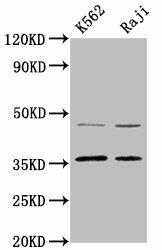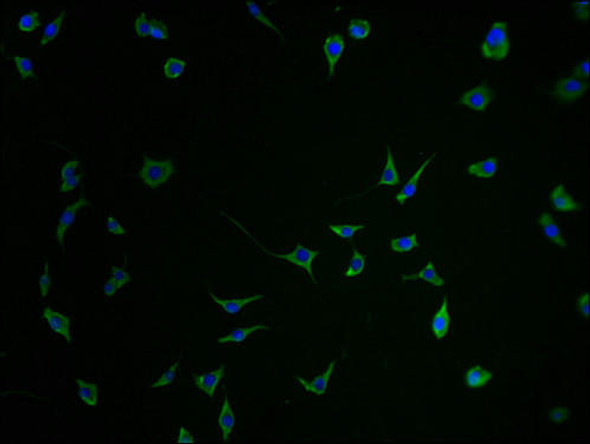Description
MAGEA2 Antibody (PACO61554)
The MAGEA2 Antibody (PAC061554) is a highly specific and sensitive tool for studying the expression and function of MAGEA2, a member of the MAGE gene family that is overexpressed in various types of cancer. This polyclonal antibody, produced in rabbits, is validated for use in Western blot applications and immunohistochemistry, allowing for the detection and localization of MAGEA2 protein in cancer tissues and cell lines.MAGEA2 is known to play a role in tumor development and progression, making it a promising target for cancer research and therapy. By targeting MAGEA2 with this antibody, researchers can gain valuable insights into its involvement in tumorigenesis and potentially identify new strategies for cancer treatment.
Additionally, the MAGEA2 Antibody may also be useful in investigating the diagnostic and prognostic significance of MAGEA2 expression in various cancer types.Overall, the MAGEA2 Antibody (PAC061554) is a valuable tool for researchers studying the role of MAGEA2 in cancer biology, offering high specificity and sensitivity for detecting this important cancer-associated protein in experimental settings.
| Antibody Name: | MAGEA2 Antibody (PACO61554) |
| Antibody SKU: | PACO61554 |
| Size: | 50ug |
| Host Species: | Rabbit |
| Tested Applications: | ELISA, WB |
| Recommended Dilutions: | ELISA:1:2000-1:10000, WB:1:500-1:5000 |
| Species Reactivity: | Human |
| Immunogen: | Recombinant Human Melanoma-associated antigen 2 protein (1-104AA) |
| Form: | Liquid |
| Storage Buffer: | Preservative: 0.03% Proclin 300 Constituents: 50% Glycerol, 0.01M PBS, pH 7.4 |
| Purification Method: | >95%, Protein G purified |
| Clonality: | Polyclonal |
| Isotype: | IgG |
| Conjugate: | Non-conjugated |
 | Western Blot. Positive WB detected in: K562 whole cell lysate, Raji whole cell lysate. All lanes: MAGEA2 antibody at 4.4µg/ml. Secondary. Goat polyclonal to rabbit IgG at 1/50000 dilution. Predicted band size: 36 kDa. Observed band size: 36 kDa. |
| Background: | Reduces p53/TP53 transactivation function through recruitment of HDAC3 to p53/TP53 transcription sites. Also represses p73/TP73 activity. Proposed to enhance ubiquitin ligase activity of RING-type zinc finger-containing E3 ubiquitin-protein ligases. In vitro enhances ubiquitin ligase activity of TRIM28 and stimulates p53/TP53 ubiquitination by TRIM28 potentially in presence of Ubl-conjugating enzyme UBE2H. Proposed to act through recruitment and/or stabilization of the Ubl-conjugating enzyme (E2) at the E3:substrate complex. May play a role in embryonal development and tumor transformation or aspects of tumor progression. In vitro promotes cell viability in melanoma cell lines. Antigen recognized on a melanoma by autologous cytolytic T-lymphocytes. Negatively regulates acetylation and sumoylation of PML and represses PML-induced p53/TP53 acetylation and activation. |
| Synonyms: | Melanoma-associated antigen 2, Cancer/testis antigen 1.2, CT1.2, MAGE-2 antigen, MAGEA2, MAGE2, MAGEA2A, AND, MAGEA2B, MAGE2, MAGEA2 |
| UniProt Protein Function: | MAGE-A2: Reduces p53/TP53 transactivation function through recruitment of HDAC3 to p53/TP53 transcription sites. Also represses p73/TP73 activity. Proposed to enhance ubiquitin ligase activity of RING-type zinc finger-containing E3 ubiquitin-protein ligases. In vitro enhances ubiquitin ligase activity of TRIM28 and stimulates p53/TP53 ubiquitination by TRIM28 potentially in presence of Ubl-conjugating enzyme UBE2H. Proposed to act through recruitment and/or stabilization of the Ubl-conjugating enzyme (E2) at the E3:substrate complex. May play a role in embryonal development and tumor transformation or aspects of tumor progression. In vitro promotes cell viability in melanoma cell lines. Antigen recognized on a melanoma by autologous cytolytic T- lymphocytes. |
| UniProt Protein Details: | Protein type:Cancer Testis Antigen (CTA) Chromosomal Location of Human Ortholog: Xq28 Cellular Component: PML body; nucleus Molecular Function:protein binding; histone deacetylase binding; ubiquitin protein ligase binding Biological Process: transcription, DNA-dependent; cellular protein catabolic process; positive regulation of ubiquitin-protein ligase activity; negative regulation of transcription from RNA polymerase II promoter; negative regulation of protein sumoylation |
| NCBI Summary: | This gene is a member of the MAGEA gene family. The members of this family encode proteins with 50 to 80% sequence identity to each other. The promoters and first exons of the MAGEA genes show considerable variability, suggesting that the existence of this gene family enables the same function to be expressed under different transcriptional controls. The MAGEA genes are clustered at chromosomal location Xq28. They have been implicated in some hereditary disorders, such as dyskeratosis congenita. This gene has two identical copies at different loci. [provided by RefSeq, Jul 2008] |
| UniProt Code: | P43356 |
| NCBI GenInfo Identifier: | 1170856 |
| NCBI Gene ID: | 266740 |
| NCBI Accession: | P43356.1 |
| UniProt Secondary Accession: | P43356,Q32NC6, A8K328, |
| UniProt Related Accession: | P43356 |
| Molecular Weight: | 314 |
| NCBI Full Name: | Melanoma-associated antigen 2 |
| NCBI Synonym Full Names: | melanoma antigen family A, 2B |
| NCBI Official Symbol: | MAGEA2B |
| NCBI Official Synonym Symbols: | MAGE2; MAGEA2 |
| NCBI Protein Information: | melanoma-associated antigen 2; CT1.2; MAGE-2 antigen; melanoma antigen 2; cancer/testis antigen 1.2; melanoma antigen, family A, 2, copy b |
| UniProt Protein Name: | Melanoma-associated antigen 2 |
| UniProt Synonym Protein Names: | Cancer/testis antigen 1.2; CT1.2; MAGE-2 antigen |
| UniProt Gene Name: | MAGEA2 |
| UniProt Entry Name: | MAGA2_HUMAN |










